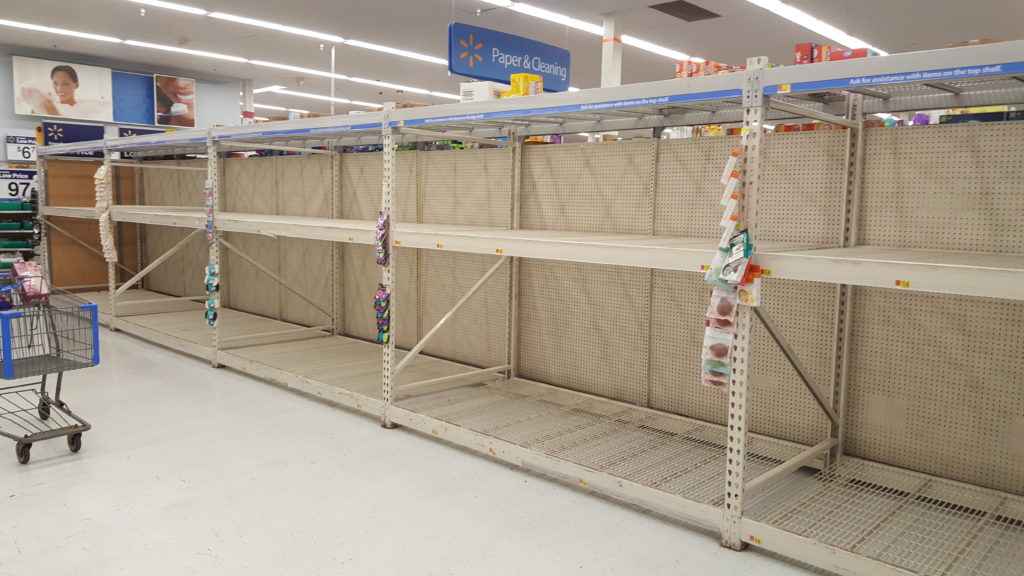How to Prepare for a Mental Health Crisis During the Coronavirus Outbreak
Many of us are in the process of getting ourselves ready for the onset of coronavirus (COVID-19), the new viral strain in the coronavirus family that causes symptoms like dry cough, fever and shortness of breath.
From what I saw while shopping today, both in the mass of people filling the stores and the empty store shelves, it seems most of us are expecting to be quarantined or will be practicing social distancing. I saw many people walking around with heaping carts of canned goods, big bags of rice and — if they were lucky enough to find it — toilet paper. (I had to try several stores today for that item.)
I picked up bits of conversations while traversing the isles. Some people were talking about how there wasn’t any toilet paper. Some people were talking about so-and-so, whom they were worried about. Some people were talking about an event that has been canceled, or the trip they are not sure they’ll get to take. Overall, there is a palpable sense of uneasiness that permeated the aisles.

I find it fascinating to watch (from a sociological perspective) how people are reacting to our current circumstances. On social media, there are streams of viewpoints that might make a person wonder if they are even talking about the same issue. Some people reacting as if the virus is a precursor to the apocalypse and just as many saying the coronavirus is a hyped-up issue created by the press.
Personally, I don’t think this is the beginning of the apocalypse, but I also grieve for the families who are planning funerals for their loved ones. Tragically, for many, coronavirus will be the end of this world and I find no humor in the dismissive jokes I am hearing and seeing online.
Ultimately, I don’t think anyone can say definitively what will happen because there is still so much we don’t know. What I do know is that there are things I can control and some I cannot. I need to address the things I can control, if not for myself then for the sake of the people with whom I may come into contact. Even if I get the virus and make it through just fine, the person I come into contact with may not. I need to be my brothers’ and sisters’ keeper, in a sense.
There is also something I want to suggest, while we are in the mode of becoming prepared for what may happen next, that we also plan for another potential emergency: a mental health emergency.
Do you know what you would do if you found yourself or someone you love in a mental health crisis? Who would you call? Where would you go? What is your safety plan? So often we plan for emergencies that are thrust upon us by what is happening in our environment, such as:
“How do I get out of the house if it was on fire?”
“Where would I go if there was a tornado, or hurricane or the coronavirus?”
Regularly, though, people will place their mental health on the back burner during times like this pandemic. I don’t say that as a critique or a jab at the people who are talking about the virus in the media and the medical community — that somehow, they are not doing a good enough job. I believe they are doing a good job and I am grateful for the effort being made to address this issue. I am just saying that mental health support is something we need to prepare for as well.
For instance:
- If you are quarantined, would you have someone to talk to over the phone?
- Do you have the Suicide Prevention Lifeline number on your phone? It’s 800-273-TALK(8255).
- Have you searched for an option for support in the event of closure of your mental health practitioner’s office? Are you familiar with the option of teletherapy or internet services?
- Is there anyone you can connect with if you don’t feel safe attending a group event that may have a lot of people such as support groups, recovery meetings or church services?
- Have your prescriptions been filled?
- Is the food you’re buying as healthy as you can afford so that your physical needs are also supporting your mental health needs?
- Do you have things to keep you occupied if you need to spend two weeks at home?
There are many different things that can be done to support mental health during this time, so I don’t suggest trying to tackle them all at once. At the same time, don’t forget them either. I know that this may seem like one more thing you need to do, but you are important and worth the effort needed to take care of yourself.
It is OK to make yourself and your mental health a priority, the world needs you.
Concerned about coronavirus? Stay safe using the tips from these articles:
Photo by Oliver Hae on Unsplash

